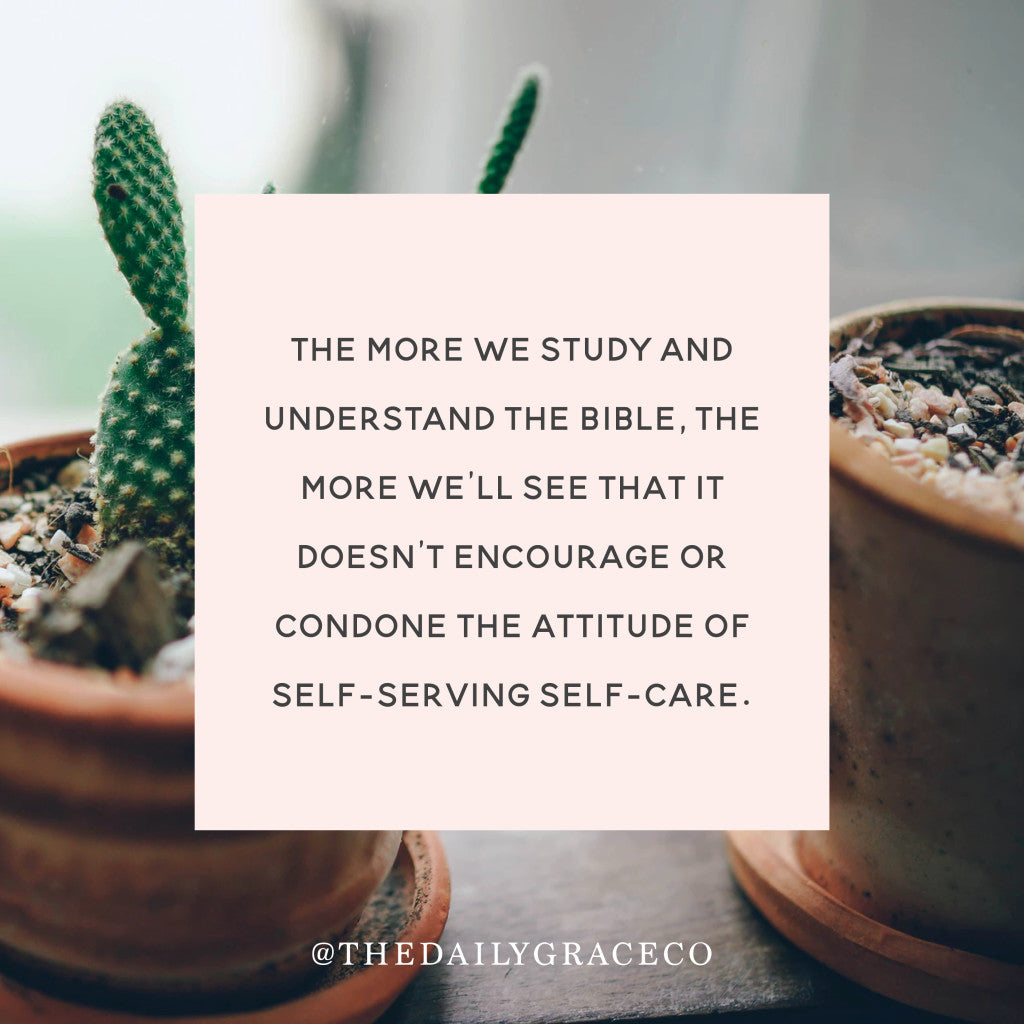There's been a trend growing in popularity over the last year, and in 2017 it seemed to explode. It's a trend that seems harmless. In fact, its whole purpose is to help people feel better, to give people more confidence and comfort. But as harmless as it seems, my unpopular opinion of this popular trend is that it's time to put it to death.
What's the trend, you ask? Self-care.
Self-care as a commodity is all around us. From holiday sales beseeching us, to "treat yourself," to companies marketing products specifically for self-indulgence, to social media influencers profiting off of the idea that we can't be healthy without investing in self-care at least once a week. It's a topic that cannot be escaped. And it seems purposeful. It seems good. It seems, for many Christian women, steeped in biblical ideas of treating our bodies with respect, taking time to rest, and tuning into our hearts.
But these biblical ideas are loose translations of theology at best, and at worst, they do a serious disservice to the beauty of the true gospel, which is a far cry from a humanity which relies so heavily on self-care.
At face value, self-care seems steeped in the idea of rest, a biblical tradition that we are commanded to do with reverence and regularity. So where have we gone wrong? If the basis of self-care is rooted in something near and dear to our faith, how has it become something which is dangerous to the integrity of the gospel?

Self-care, the 2017 version, gains momentum when we believe we need to escape from our lives. That our lives are not, and cannot be, restful in any meaningful way, and as a result, we must schedule specific time to treat ourselves. Self-care teaches us to prioritize our own comfort, to set aside time to "treat" ourselves, and to consider ourselves worthy of spoiling.
Here's the thing–Jesus proclaims to be our rest. He promises to be rest for those who are weary and heavy-laden. He promises that His burdens are light (Matthew 11:28). God promises that those who abide with Him will continually renew their strength (Isaiah 40:31). These promises are not once-a-week promises. They aren't checks to be cashed in when our jobs have made us run-down, or sickness has overcome us, or we just need a vacation. These are everyday promises, meant to equip us to live a life that has a sense of rest in all seasons. These promises of rest, from God in the Old Testament, fulfilled by Christ in the New Testament, and made available to us through the Holy Spirit, help us live in such a way that we should not need to escape from our lives.
The more we study and understand the Bible, the more we'll see that it doesn't encourage or condone the attitude of self-serving self-care. I read passages about considering others more important than ourselves (Philippians 2:3), of loving and serving those who cannot repay (Luke 14:12-14), of becoming like a Savior who came to earth not as a king but as a servant (Philippians 2:5-7). I read about the importance of humbling ourselves (Matthew 5:5), of giving to the least and the last (Matthew 25:40), of continuing to do good (Galatians 6:9).
The very opposite of self-care. Or at least the things that drive us to need self-care.

On the other hand, we live in a world that is busy, and there's nothing wrong with wanting to do something nice for ourselves, right? So how do we reconcile the gospel of Jesus Christ with our desire for self-care?
The truth is, it's important to care for ourselves. Just as the Bible teaches that we are to humble ourselves, it also reminds us that our bodies are living sacrifices, temples, to be treated with respect and used for God's glory (1 Corinthians 6:19). Of course we must care for ourselves. But our purpose in caring for ourselves is not to serve ourselves, but to glorify our King. Not to force rest, but to find a reverent pattern of rest. Not to spoil ourselves, but to appreciate and praise God for all the blessings He has given us.
Instead of focusing on self-care as the world teaches it–a retreat from lives that are busy and anxiety-ridden beyond our control–let's focus on self-care as Jesus might have practiced it. Spending time in prayer. Meditating on the Scriptures. Treating our bodies with care and tenderness. Being in community that allows for vulnerability, so that when we need help, we can ask for it. Instead of making a list of practices to help us escape from the madness of our lives, let's prayerfully build lives we don't need or want to escape from. And in this way, we will practice a humble, gentle, Biblical form of self-care. One that doesn't demand that we count ourselves as the most important, but rather, one that allows us to see others as valuable, without taking value away from ourselves.

I'm not saying I think we should quit self-care all together. On the contrary, I believe the Christian people should be a people who care for themselves well and often, since we know we're made in the image of God. But instead of indulging in a self-care gospel that boasts of materialism and temporal comforts, let's indulge in one that boasts of our Savior's sweetness and sovereignty.
In 2017, I wanted to bury the self-care gospel. In 2018, I'd like to see us practice a mercy-first approach, where our lives are so centered on Christ that we're practicing self-care day in and day out. And then let's use our true and better self-care to care not only for ourselves, but for the broken and hurting and lost world around us.
By Grace Dellis
Originally published in Be Still Magazine, issue 8.










